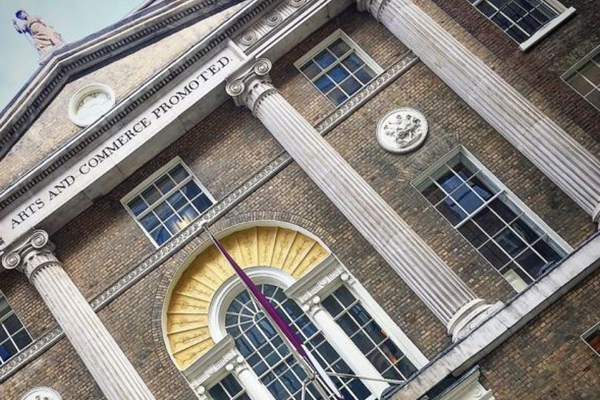An invitation from leadership coach Lee Chalmers FRSA enticed me to a very enjoyable launch event for an interesting research report by the Office for National Statistics and the Barrett Values Centre on the UK’s national and community values - including the UK’s very high - 59% - level of ‘cultural entropy’, a measure of dysfunctional values.
But it was the way the event really engaged its large audience at London’s Conway Hall - a historic centre for free thinking - that particularly impressed me.
An exercise to decide on, and then discuss - in pairs - our own values, beliefs and behaviours did indeed seem able to ‘help you meet someone more deeply, even if you’ve worked with them for ten years’, as one audience member put it.
The exercise had three steps:
- Please choose three values that are important to you in your life
- What are your beliefs that support this value?
- What behaviours do you exhibit that support this value?
We were offered 70 suggested values to help us with the first question - everything from job security to wisdom.
What would a private detective think about your values if they followed you around for six months?
You can download the guidance page for the Values exercise - and use it to generate a revealing discussion at your own meeting or event. (A less cluttered version of the exercise sheet is here - though it offers fewer examples of values to choose from.)
The UK values report - ‘cultural entropy’ in the UK
The Office of National Statistics/Barrett Values Centre report itself revealed that UK citizens value meaningful, close relationships and operate with a strong sense of integrity. Top personal values included caring, family, honesty, humour and fun, friendship, fairness and compassion, as well as independence, respect and trust.
But, when asked about the values of the nation as a whole, a rather depressing picture of the UK’s values emerged: bureaucracy, crime and violence, uncertainty about the future, corruption, blame, wasted resources, media influence, conflict/aggression, drugs/alcohol abuse and apathy.
‘Cultural entropy’ - a measure of the proportion of dysfunctional and negative values - was found to be 59% in the UK. Bhutan, by contrast, had a cultural entropy level of only 4%. 
Some people will quite rightly point out that our espoused values can all too often tend to be rather more uplifting than the values we in fact exhibit in our day-to-day behaviour.
The audience was encouraged to look candidly at whether we are really living our values: ‘what would a private detective think about your values if they followed you around for six months?’
(An automated values analysis of the texts of Matthew Taylor’s Twenty-first century enlightenment pamphlet and the RSA’s Purpose, Vision & Strategy is here. It uses a version of the 'Hall-Tonna values inventory', a precursor model to Richard Barrett's).
The current controversy over how best to work with values for effective behaviour change: two models at loggerheads
For me, the most intriguing - and crucial - argument around values at the moment is between Pat Dade’s Maslow-based ‘Values Modes’ approach (articles and a free 'Values Modes' assessment are here) and the approach outlined in the WWF’s 2010 report ‘Common Cause - The Case for Working with our Cultural Values’.
They are both very influential amongst numerous organisations seeking behaviour changes towards more sustainable, environment-friendly behaviours - but each believes that the other approach contains a fundamental flaw which will derail its hopes to enable behaviour change.
Common Cause warn that the Maslow-based ‘Values Modes’ approach is wrong to encourage strategies which dress up eco-friendly actions so that they can also appeal to status-conscious - dare I say selfish? - ‘Outer Directed’ people. Rather than satiating that level of Maslow’s ‘Hierarchy of Needs’ - and thus prompting people move to new more globally compassionate, caring needs - they will just strengthen the values of selfish consumerism, they argue.
Pat Dade, by contrast, warns that Common Cause’s advocacy of deeper green language - that his research finds appeals particularly to a narrow subset of the population called ‘Concerned Ethicals’ - will just alienate many, perhaps even most of the UK population, who don’t enjoy the feeling of being lectured in worthy-sounding Guardian-esque language, and rarely if ever change their behaviour as a result of it.
One attendee at the RSA’s recent Social Entrepreneurs Network meeting - who had worked for a leading environmental communications agency Futerra Sustainability Commuications - told me that while her radical heart would love Common Cause to be right, for effective communication and behaviour change, she would always opt for Values Modes (which have in fact been used in recent work the RSA has done in conjunction with The Campaign Company).
Matthew Mezey is Online Community Manager. Twitter: Matthew Mezey
LINKS
- The United Kingdom Values Survey - Increasing Happiness by Understanding What People Value (pdf)
- Barrett Values Centre (their free values assessment is here)
- Plainer version of personal values exercise worksheet (though with fewer suggested values)
- Cultural Dynamics/Values Modes (includes free values assessment)
- ‘We shouldn’t simply try to change people’s values when it comes to the environment‘ [Blog in The Independent by recent RSA speaker Tony Juniper on the 'Values Modes' approach ]
- Common Cause’s critique of Tony Juniper blog about Values Modes
Related articles
-
What is the RSA?
Anton Howes
The RSA historian-in-residence on over 270 years of work to benefit the public as “the nation’s improvement agency.”
-
Can authenticity prevent chaos?
Barwise
Michael Barwise takes aim at conformism and the illusion of individuality.
-
Values and Wellbeing
Charles Fowler FRSA
Ahead of World Values Day 2019, Charles Fowler FRSA outlines the importance that consideration of our values holds.




Join the discussion
Comments
Please login to post a comment or reply
Don't have an account? Click here to register.
This interesting and challenging comment comes from Nick Shannon (who had problems posting it himself):
There is, perhaps, a deeper problem with 'values' based work than
this debate about the better of two models. Both models seem to have an underlying assumption that a psychological construct such as a person's values can be measured and quantified, as if it had physical properties, and then manipulated to change that person's behaviour.
This assumption, which leads to the production of questionnaires, and then comparative statistics based on normal distributions, should not be taken for granted.
As an abstract concept, I question whether a 'value' can be separated from the context in which it is applied or its relationship to other aspects of a person's psychology, or indeed the social world of which they are a pert. The idea that peoples' values can be changed in the same way as people change their clothes, appealing as it is in the current vogue of "change management", strikes me as highly suspect.
Nick
There's more that could be said about our 'espoused' values vs the values we really use.
Becoming conscious of such a gap is certainly no easy task, though specific techniques exist to do this, such as Prof Chris
Argryis ‘Left-Hand Column’ exercise: http://www.actiondesign.com/re...
In this exercise, you write out a representative and challenging workplace conversation - and include an extra column for all the thoughts and feelings you had - but kept to yourself.
Examining this column’s contents can slowly make conscious all the hidden frames that are really motivating us. That is if we dare look at it and are open to developing a healthy distrust of our own thinking; it’s much easier, of course, to just carry on with embedded assumptions such as that the other person is the problem, that our conclusion is factual etc etc...
Matthew